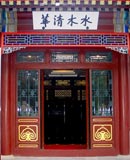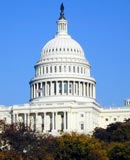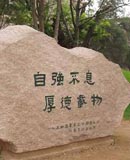不支持Flash
|
2010年考研英语完形填空三套模拟试题
完形填空模拟试题一
As former colonists of Great Britain, the Founding Fathers of the United States adopted much of the legal system of Great Britain. We have a “common law”, or law made by courts 1 a monarch or other central governmental 2 like a legislature. The jury, a 3 of ordinary citizens chosen to decide a case, is an 4 part of our common-law system。
Use of juries to decide cases is a 5 feature of the American legal system. Few other countries in the world use juries as we do in the United States. 6 the centuries, many people have believed that juries in most cases reach a fairer and more just result 7 would be obtained using a judge 8 , as many countries do. 9 a jury decides cases after “ 10 ”, or discussions among a group of people, the jury’s decision is likely to have the 11 from many different people from different backgrounds, who must as a group decide what is right。
Juries are used in both civil cases, which decide 12 among 13 citizens, and criminal cases, which decide cases brought by the government 14 that individuals have committed crimes. Juries are selected from the U.S. citizens and 15 . Jurors, consisting of 16 numbers, are called for each case requiring a jury。
The judge 17 to the case 18 the selection of jurors to serve as the jury for that case. In some states, 19 jurors are questioned by the judge; in others, they are questioned by the lawyers representing the 20 under rules dictated by state law。
1.[A]other than[B]rather than[C]more than[D]or rather
2.[A]agency[B]organization[C]institution[D]authority
3.[A]panel[B]crew[C]band[D]flock
4.[A]innate[B]intact[C]integral[D]integrated
5.[A]discriminating[B]distinguishing[C]determining[D]diminishing
6.[A]In[B]By[C]After[D]Over
7.[A]that[B]which[C]than[D]as
8.[A]alike[B]alone[C]altogether[D]apart
9.[A]Although[B]Because[C]If[D]While
10.[A]deliberations[B]meditations [C]reflections[D]speculations
11.[A]outline[B]outcome[C]input[D]intake
12.[A]arguments[B]controversies[C]disputes[D]hostilities
13.[A]fellow[B]individual[C]personal[D]private
14.[A]asserting[B]alleging[C]maintaining[D]testifying
15.[A]assembled[B]evoked[C]rallied[D]summoned
16.[A]set[B]exact[C]given[D]placed
17.[A]allocated[B]allotted[C]appointed[D]assigned
18.[A]administers[B]manages[C]oversees[D]presides
19.[A]inspective[B]irrespective[C]perspective[D]prospective
20.[A]bodies[B]parties[C]sides[D]units
文章背景
本文介绍了美国的陪审团制度。
文章结构
第一段指出,陪审团是美国共同法系统的基本组成部分。第二段分析了使用陪审团的原因。第三和四段分别介绍了陪审团的类型和选举程序。
第一段:陪审团是美国共同法系统的基本组成部分(主题)
The jury, a 3 of ordinary citizens chosen to decide a case, is an 4 part of our commonlaw system。
第二段:使用陪审团的原因
Use of juries to decide cases is a 5 feature of the American legal system. Few other countries in the world use juries as we do in the United States。
第三和四段:陪审团的类型和选举程序。
Juries are used in both civil cases…
The judge 17 to the case 18 the selection of jurors to serve as…
答案详解
1.【解析】[B] 逻辑衔接题。空格前后是两个并列的名词courts和a monarch,所在句子的含义为:“共同法”是由法庭1君主制定。根据常识可知,美国是民主制国家,法律不由君主制定。因此空格处填入的连接词应肯定前者而否定后者,正确项是[B]rather than,即“法庭而不是君主”。other than通常用在否定句中,表示排除意义,即“除了”,相当于except。rather than是连词,前后连接的成分应保持一致,可以是名词、动词、形容词、从句等,通常译为“而不是”,有时可用介词短语 instead of替代。more than连接名词时除了表示“多于,超过……以上”,也可以表示“不仅仅,不只是”,相当于not only。or rather表示“更确切的说法是……”,相当于more exactly。
2.【解析】[D]语义衔接题。空格处填入的名词和governmental搭配,表示“像立法机关这样的中央政府……”。[A]agency一般指“服务机构,尤其是代理或经销机构”;也可以指(提供特别服务)的政府专门机构,如the Central Intelligence Agency(美国中央情报局)。[B]organization泛指各种组织、团体和机构。[C]institution多指“大规模的用于特殊目的的组织”,如educational institution(教育机构);或者指各种慈善机构和社会福利机构。[D]authority可表示“有权力做决定或在某个地区有特别责任范围的人们或组织”,即“当局,当权者”。文中legislature指“有权制定或修改法律的一群人”,即“立法机关”。因此[D]项为最佳答案。
3.【解析】[A]语义衔接题。[A]项panel指“一组(给予意见和观点的人)”,如a panel of experts专家组。crew指“(有专门技术的)一组工作人员,一起工作的一群人”;band指“(因为某种共同的目的而组成且有首领的)一帮人”;flock指a crowd, large number of people。而空格所在部分指的是陪审团小组,就被告有罪无罪给出观点的一组人,因此[A]项正确。
4.【解析】[C]语义衔接题。空格所在部分的含义是:陪审团是共同法系统……部分。innate意为“天生的,先天的(品质、情感等)”;intact意为“完整无缺的”;integral意为“必须的,不可或缺的”;integrated意为“各部分密切协调的,完整的,综合的”。根据文意,应选[C]项。
特别说明:由于各方面情况的不断调整与变化,新浪网所提供的所有考试信息仅供参考,敬请考生以权威部门公布的正式信息为准。
网友评论
更多关于 考研 英语 的新闻
- 名师支招:考研英语超纲词处理办法2009-09-22 15:12:09
- 指导:07-09年考研英语完型填空真题解析2009-09-22 14:59:27
- 专家支招:2010年考研英语写作备考策略2009-09-22 14:29:29
- 名师指导:2010年考研英语题型分析之写作篇2009-09-22 14:27:40
- 视频:如何正确把握考研英语阅读文章重点2009-09-22 12:04:08
- 强化阶段:科学方法记忆考研英语词汇2009-09-18 15:48:41
- 备考指南:2010考研英语完形填空基本解题策略2009-09-17 14:41:56
- 2010年英语专业考研英语基础模底测试题2009-09-16 18:09:42
- 权威解读:考研英语新题型命题特点2009-09-16 13:50:13
- 名师解读:考研英语阅读理解真题导向性2009-09-16 13:48:49
- 名师解析:考研英语历年词汇考试详情(组图)2009-09-15 18:25:08
- 2008年考研英语翻译历年真题精析2009-09-15 17:22:57
- 名师指导:考研英语翻译历年真题精析(2008)2009-09-15 17:22:57
- 视频:考研英语难度分析及真题使用方法2009-09-15 14:02:49
- 视频:2010年考研英语完美单词记忆法2009-09-15 13:56:35







